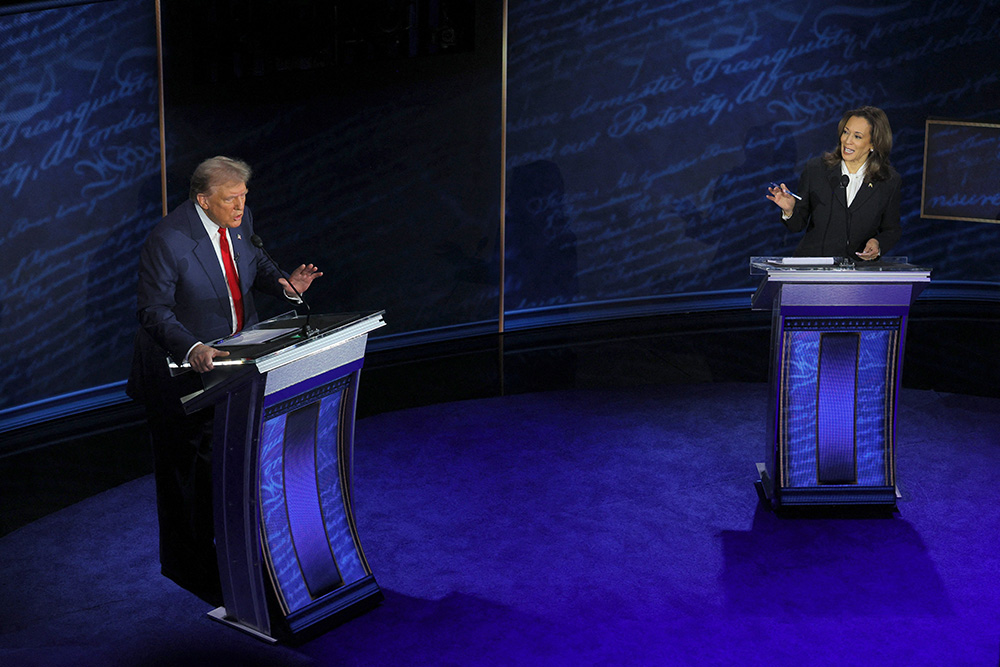
Republican presidential nominee and former U.S. President Donald Trump, and Democratic presidential candidate and U.S. Vice President Kamala Harris, take part in the presidential debate at the National Constitution Center in Philadelphia Sept. 10, 2024. (OSV News/Reuters/Brian Snyder)
A group of evangelical Christians hoping to reclaim their tradition from the culture wars put out a call Monday (Sept. 9) for a broader understanding of evangelicalism urging a rejection of "political idolatry and its messengers" as well as the "false idols of power, wealth, and strength rather than the true God."
The effort, titled "Our Confession of Evangelical Conviction," is laid out in a new religious statement unveiled last week, signed by an array of evangelical pastors and leaders. "We reject the false teaching that anyone other than Jesus Christ has been anointed by God as our Savior, or that a Christian’s loyalty should belong to any political party," the confession reads in part.
The signers include Dan Boone, president of Trevecca Nazarene University and board chair of the Council for Christian Colleges and Universities; Raymond Chang, a pastor and head of the Asian American Christian Collaborative; and Richard Mouw, a theologian and a former president of Fuller Theological Seminary.
Former President Donald Trump isn’t mentioned in the statement, and supporters of the confession, speaking in a virtual news conference Monday, insisted their efforts weren’t singularly about his presidential campaign. But they acknowledged their new movement is at least partly a response to fervent evangelical support that helped to fuel the business mogul’s rise to power.
Among the document’s seven "convictions," Mouw noted at the news conference, is the call to "recognize godly leaders by their character," an instruction he framed as timely: Some conservative Christians, he said, explain away politicians’ immoral behavior by citing otherwise unethical biblical figures who nonetheless helped implement God’s plan — an argument used by conservative Christians who back Trump.
"I see this statement as a very important call to teaching," Mouw told reporters on the call.
The other "convictions" listed in the document include giving allegiance to Jesus Christ alone, leading "with love not fear," submitting to the "truth of Scripture," believing the Gospel "heals every worldly division," committing to the "prophetic mission of the Church" and valuing every person as created in God’s image.
"We pray that God’s Spirit will revive our Church and strengthen Christ’s people to be agents of his presence and blessing in this turbulent age," the document concludes.
Several of the signers said political polarization and the culture wars are driving evangelicals away from the tradition, with some abandoning the term "evangelical" altogether. But Christina Edmondson, former dean of intercultural student development at Calvin University, insisted on a broader vision for evangelicalism, pointing to two historically Black denominations, Church of God in Christ and Progressive National Baptist Convention, that have also endorsed the confession.
Advertisement
She was echoed by the Rev. Gabriel Salguero, head of the National Latino Evangelical Coalition, who said some pastors avoid preaching on the New Testament’s Sermon on the Mount because "it may be seen as too polarizing or political." He argued Hispanic and Latino evangelicals — a fast-growing sector of evangelicalism — don’t want the tradition "to be defined for us."
"Some people have abandoned the term (evangelical) because it’s been too rooted in partisanship or cruelty or incivility," Salguero said. "But I’m one of those that wants to claim it and say, 'Hey, look, no one gets to define the term 'evangelical' — from (the Greek word) 'evangelion' — but Scripture.'"
The statement includes signatures by figures once broadly lauded by evangelicals but who have been pushed to the margins of the tradition since the rise of Trump. That includes Shane Claiborne, an activist and co-founder of the social justice group Red Letter Christians, who was among the first to organize protests against conservative Christian supporters of Trump after his election in 2016. The Rev. Russell Moore, an early Trump critic who once ran the Southern Baptist Convention’s policy arm but now attends a non-SBC church, also signed the statement.
Asked about the confession Tuesday, Moore, who is a partner in the anti-polarization effort called the After Party, told Religion News Service that he views the document as an "attempt to give words to a particular state of unease that some Christians have with the polarized environment around us, and to help them to think through what’s next."
It’s an open question how much traction the group will get from the broader conservative evangelical community, but Skye Jethani, co-host with Phil Vischer of the evangelical-oriented "Holy Post" podcast, said he hopes the confession will embolden people who feel unable to speak out."There are well-intentioned godly women and men in leadership roles and congregations, but they have felt so isolated because there hasn’t been more of a coordinated response," Jethani said.He also pointed to a "strategic" aspect of the statement: speaking to younger evangelicals who feel frustrated by the theology — or politics — of their religious elders.
"Hopefully, younger generations can look at this statement, look at the women and men who’ve signed the statement … and recognize it as a remnant who are putting their commitment to Christ and his gospel ahead of political allegiance," he said.






